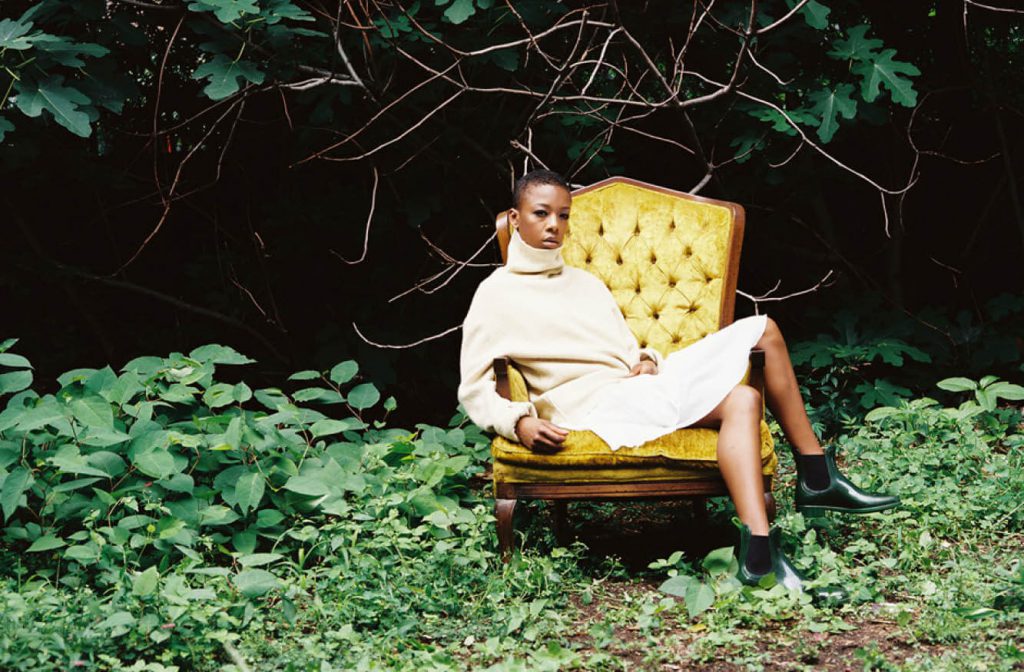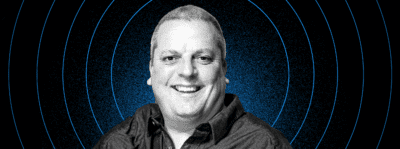Samira Wiley: A Poussey By Any Other Name

Stylist’s own striped shirt,
Mother jeans, Jeffrey Campbell boots.
SAMIRA WILEY IS TINY. Many actors are, of course, but it’s particularly surprising in Wiley’s case, because the energy and strength she projects on screen seem so much greater than what her small frame could possibly contain. And yet it only takes a few minutes with Wiley to appreciate that this is someone who gets things done: one moment she’s dancing to music from a playlist on her phone (heavy on Missy Elliott, with a little LL Cool J thrown in), the next she’s making a goofy 420 joke followed by a larger-than-life laugh at herself. Then comes an abrupt transformation into someone who can model the hell out of a big hat, until finally she’s all smiles as she says goodbye and heads off to pick up her mom from the airport. It’s enough to make your head spin.
In just two seasons on Orange Is the New Black, Wiley has made plenty of heads spin with her portrayal of inmate Poussey Washington, who has come to serve as a moral center for the show—the “stand-up guy,” as Wiley describes it. And as Poussey has become a fan-favorite, so has Wiley herself, whose fans respond not only to her nuanced, sensitive portrayal of Poussey (Wiley is Juilliard-trained), but also to her general energy and humor, a vitality that’s evident on her Instagram, where she has amassed over half a million followers. We spoke with Wiley about her experience on OITNB, her social media game, what she loves about living in New York, and which theatrical role she’d love to play. (Hint: It involves a balcony.)
What was it about Orange Is the New Black that first caught your eye? Was there anything in particular about the show that really appealed to you?
When I first read the script, I remember thinking that it was so different from anything else out there. There were so many women characters! I’m also a fan of Jenji Kohan, so I think that was the first thing that drew my eye, but also the women in the pilot were so different from each other, and so different from what else I’d seen on television. They were all fully fleshed out characters with different backgrounds, and they were different sizes and shapes… different everything. It just felt like something I could be a part of.


That’s definitely one of the things that makes this show unique; it shows lots of different women, flaws and all. Your character, Poussey, probably has fewer flaws than many of the others. Despite being in prison, she still lives according to a real moral code, and acts in a way that is easy to empathize with and impossible to root against. What is it that makes Poussey special?
I think Poussey has an incredible amount of integrity. She’s that stand-up guy, you know what I mean? She’s going to do the hard thing, like when all her friends are jumping off a bridge, she’s going to be the one saying,“Wait, why are we doing this again?” I love playing someone who has so much integrity, who has so much joy and so much life—even though her life is now in prison. She’s locked up, but she’s able to build up joy anyway. You see it with Taystee in the first season, and then you see more in the second season, like when we learn about the kind of background she comes from, one with a loving home and some stability. You can see how that’s shaped her, and I think it’s so important to have had that.
Yeah, Poussey makes it possible to see how, in a sense, we’re all kind of one or two bad decisions away from going down a bad path, even if that path isn’t prison. But once you’re on that path, how you act really matters, and for many of these prisoners, background is everything. Before this season, did you know Poussey’s backstory? [Poussey is revealed to have been partially raised in Germany; Wiley spoke German with a spot-on accent]
No, we really don’t know anything. When we read the new episodes, it’s like watching it as a viewer. I didn’t know any other language, much less German. Jenji told me a little before the episode filmed; she hinted at it. But I only had a dialogue coach a couple weeks before, so it helped that I’d had phonetics training in the past.


Well, your German was flawless.
Ha. Thank you!
What’s changed for you in your day-to-day life since you got this role?
My sense of anonymity—even in New York City—is definitely waning. It’s a little difficult to walk down the street. People do really love Poussey, and they want to connect with this character and with the person who brings this character to life. I love New York City just for the fact that I can still walk down the street and disappear in the crowds, but it’s getting harder.
So has it become impossible to take the subway?
I still do take the subway! I don’t want to be that person who just takes cabs everywhere, so I pretty much take the subway every day. I have to psych myself up for it, though. Like, OK, I’m in the subway, I’m going to be trapped for a little bit. But, you know, I come from a theater background and the one-on-one connection that you have there with the audience, sometimes I feel like that’s lost for me in film and television, so I feel like being able to connect with fans on the street is a way for me to bridge that gap.
Do you have plans to do more theater? What would be your dream role?
Absolutely. I just have to wait till we’re not shooting. I’m a firm believer in being where you are when you’re there, always being present. And so I’m all about Orange right now, but I have to do a play. That’s home for me. My dream would be Juliet in Romeo and Juliet. [laughs] So cliché!
One of the best things about Orange is the relationship between Poussey and Taystee (played by Wiley’s Juilliard classmate, Danielle Brooks). Is it as fun for you to play as it is for viewers to watch?
It’s amazing to be able to portray that friendship, partly because of how it resonates with so many people, but also just to be able to do that with Danielle is great. There’s an unspoken, amazing chemistry between us, which I don’t even think we realized until other people started talking about it. We didn’t know it was so special, because it was just so natural between the two of us. And that kind of chemistry and that kind of trust between two women is a powerful thing.
Have you found that people have a hard time differentiating between you and your character? You seem so distinct to me, or, at least, that’s what it feels like as evidenced by your Instagram game. That just seems like it’s all you.
It can be hard for people to separate me from that character, so I think one of the reasons I like Instagram and Twitter is because I’m able to share Samira with people, and show how Samira and Poussey are different and how Samira and Poussey are the same.
It’s also easy to see via social media how thoroughly enmeshed you are in your life in New York. What is it that keeps you here, and why do you like it so much?
I’ve been here for nine years now. I still love being able to just go out and meet some random person and have that person be a friend for one night—the kind of night where, at the end of it, I can feel that “only in New York feeling.” And I love just being able to walk around. When I was a little girl, because I wanted to be an actress, I always felt New York-bound. And it didn’t disappoint! I love how diverse it is, even at the level of all the different kind of food you can get here. I love the diverse cultures, people, food… all of it. •
Follow Kristin Iversen on twitter @kmiversen


IMPROVD coat, Vaunt&Sol scarf, Christian Wijnants skirt, stylist’s own hat,
Jeffrey Campbell shoes.


Isabel Marant sweater, Loup Charmant slip, CP Shades tunic, Jeffrey Campbell shoes.


Vaunt&Sol dress.


Vaunt&Sol dress, Mother jeans, stylist’s own hat.


Stylist’s own striped shirt, Mother jeans.


Isabel Marant sweater, Loup Charmant slip, CP Shades tunic, Jeffrey Campbell boots.
Photographer’s Assistant: Bobby Davidson
Stylist: Dana Caputo
Makeup Artist: Elvire Emmanuelle for Face The Day NY
Location: Vision Untitled Studios, Brooklyn
You might also like 



















